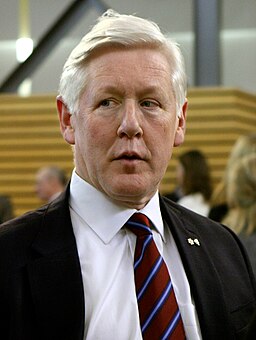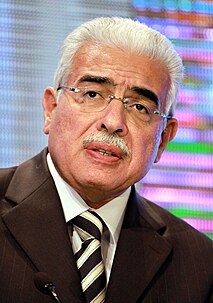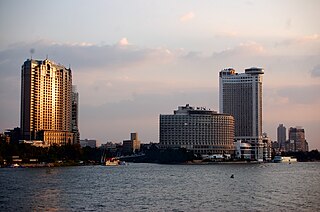
The Ontario general election of 1990 was held on September 6, 1990, to elect members of the 35th Legislative Assembly of the province of Ontario, Canada.

The Alberta general election of 2004 was the twenty-sixth general election for the province of Alberta, Canada. It was held on November 22, 2004 to elect members of the Legislative Assembly of Alberta.

Kefaya is the unofficial moniker of the Egyptian Movement for Change, a grassroots coalition which prior to the 2011 revolution drew its support from across Egypt's political spectrum. It was a platform for protest against Hosni Mubarak's presidency and the possibility he might seek to transfer power directly to his son Gamal; political corruption and stagnation; "the blurring of the lines between power and wealth; and the regime's cruelty, coercion and disregard for human rights."

The Egyptian parliamentary elections of 2005 was the scheduled three-stage elections in November and December 2005 for determining its lower house membership. The elections formed the Eighth Assembly since the adoption of the 1971 Constitution. Over 7,000 candidates competed in 222 constituencies for the Assembly's 444 elected seats.

Elections for the Shura Council, the upper house of the Egyptian parliament, was held in Egypt on 11 June 2007 and 18 June 2007. From a total of 264 seats 88 are up for election every three years, another 44 are appointed by the president.
Ahmed Ezz is an Egyptian businessman and one-time politician, the owner of Ezz Steel and the former chairman of Egypt's national assembly's budget committee. He is also a former senior member of the ruling National Democratic Party of Egypt (NDP).
Mohamed Safwat El Sherif is a former Egyptian politician, having served as Chairman of the State Information Service, Minister of Information, Speaker of the Egyptian Shura Council, and Secretary General of the ruling National Democratic Party (NDP), and Head of the Supreme Press Council and a close aide to President Mohamed Hosni Mubarak.

The 2008 Egyptian municipal elections were local elections held across Egypt on 8 April 2008.

Parliamentary elections were held in Niger on 20 October 2009, after President Mamadou Tandja dissolved the National Assembly in May 2009 and a constitution referendum was held in August 2009. The elections were boycotted by most opposition parties, and saw Tandja's National Movement for the Development of Society (MNSD) win a landslide victory.

The Egyptian parliamentary elections of 2010 first voting round was held in Egypt on 28 November 2010 and the second round was held on 5 December 2010.
Parliamentary elections were held in Egypt on 27 May 1984. Since the last election in 1979, changes had been made to the electoral system. The 176 two-member constituencies were replaced by 48 multi-member constituencies, with candidates elected on a party list system, with a party needing over 8% of the vote to win a seat.
Early parliamentary elections were held in Egypt on 6 April 1987, with a second round for nine seats on 13 April. They followed a change in the electoral law, approved by a referendum in February, which would allow independent candidates to run in the election. The result was a victory for the ruling National Democratic Party, which won 346 of the 458 seats. Following the election, the People's Assembly nominated incumbent Hosni Mubarak for the post of president, whose candidacy was put to voters in a referendum on 5 October.
Early parliamentary elections were held in Egypt on 29 November 1990, with a second round for 261 seats on 6 December. They followed a referendum in October on the early dissolution of Parliament due to issues surrounding the legality of the 1987 elections. However, the elections were boycotted by the Socialist Labour Party (SLP), the Liberal Socialists Party (LSP) and the New Wafd Party, which claimed that the reformed Electoral Law would fail to ensure free elections.

A referendum on an early dissolution of Parliament was held in Egypt on 11 October 1990. The referendum followed the Supreme Constitutional Court ruling that the 1987 elections were unconstitutional as the 1986 electoral law discriminated against independent candidates. The court ruled that any legislation passed after 2 June 1990 would not be valid. In September, President Hosni Mubarak announced that a referendum would take place to decide whether Parliament should be dissolved early.
Parliamentary elections were held in Egypt on 29 November 1995, with a second round for 168 seats on 6 December. The result was a victory for the ruling National Democratic Party (NDP), which won 318 seats. Following the election, 99 of the 112 independents also joined the NDP. Voter turnout was reported to be 47.99%.

A parliamentary election to the People's Assembly of Egypt was held from 28 November 2011 to 11 January 2012, following the revolution that ousted President Hosni Mubarak, after which the Supreme Council of the Armed Forces (SCAF) dissolved the parliament of Egypt. However the dissolution was ruled unconstitutional and Parliament was reinstated. Originally, the elections had been scheduled to be held in September 2011, but was postponed amid concerns that established parties would gain undue advantage.

Egyptian parliamentary elections to the House of Representatives were held in two phases, from 17 October to 2 December 2015. The elected parliament will be entrusted with the task of reviewing the laws that were passed while a parliament was not in session.
The We Are the People Party, also translated as the We are Egypt Party, is a political party that is made up of 270 former members of parliament. The party was formed by the Coalition of the People's Representatives, which is composed of former members of the National Democratic Party, which was formerly the ruling party of Egypt. The party was formerly known as the Egyptian Street Party. The party seeks to obtain a majority of the seats in the 2015 parliamentary election. The party prohibits Islamists and people who were involved in corruption from being involved in the party.

The Freedom and Justice Party (FJP) is an Egyptian Islamist political party. The ex-president of the party, Mohamed Morsi, won the 2012 presidential election, and in the 2011 parliamentary election it won more seats than any other party. It is nominally independent, but has strong links to the Muslim Brotherhood of Egypt, the largest political group in Egypt. The party was banned and dissolved in 2014; however, it continues to function underground.
















